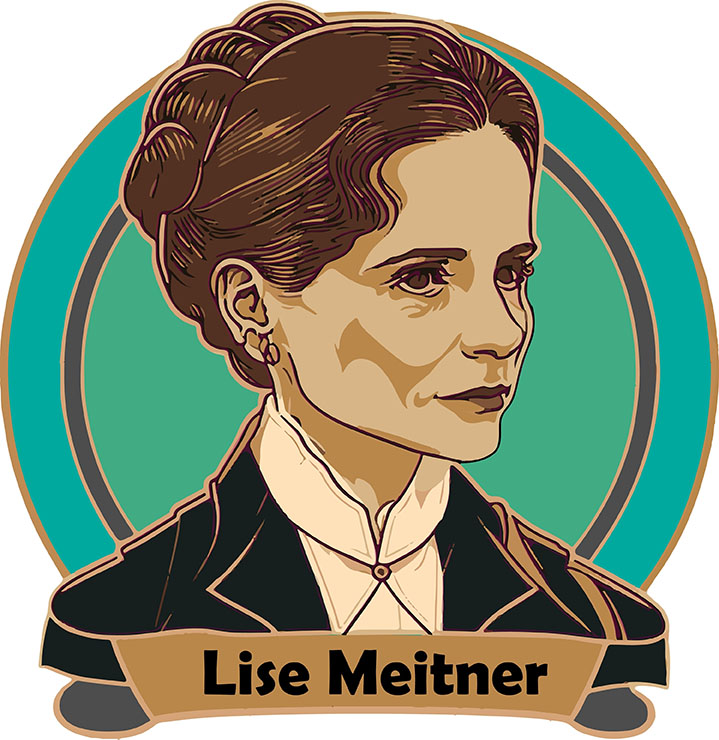

Lise Meitner was an Austrian-Swedish physicist who made significant contributions to our understanding of the atom. She was one of the first women to study physics at a university, and she was the first to propose the theory of nuclear fission.
Meitner was born in Vienna, Austria, in 1878. She studied physics at the University of Vienna, where she was one of only two women in her class. After graduating, she worked as a research assistant to Max Planck, one of the founders of quantum mechanics.
In 1912, Meitner joined the Kaiser Wilhelm Institute for Chemistry in Berlin, where she worked with Otto Hahn. Meitner and Hahn collaborated on research into radioactivity, and they were the first to propose the theory of nuclear fission. This theory explained how the nucleus of an atom could be split into two smaller nuclei, releasing a large amount of energy.
Meitner's work on nuclear fission was essential to the development of the atomic bomb. However, she was forced to flee Germany in 1938 because of the rise of the Nazis. She continued her research in Sweden, where she worked with Otto Frisch to develop the theory of nuclear fission in more detail.
Meitner was a brilliant physicist and a pioneer in the field of nuclear physics. Her work has had a profound impact on our understanding of the atom and the universe. She was a role model for women in science, and she showed that women can make significant contributions to any field.
Meitner died in Cambridge, England, in 1968 at the age of 89. She was a true pioneer in the field of physics, and her work will continue to inspire scientists for generations to come.
The Lise Meitner Institute is a leading research institute dedicated to the study of nuclear physics.

The name "Lise Meitner" does not have any different forms. It is a proper noun, which means that it refers to a specific person or place. It is not possible to change the form of a proper noun without changing its meaning.
However, there are some ways to abbreviate the name "Lise Meitner". For example, you could use the initials "LM" or the nickname "The First Lady of Physics".
The name "Lise Meitner" is a compound name, made up of two words:
Lise: A French name that means "lily".
Meitner: A German name that means "iron miner".
What is Lise Meitner famous for?
Question:
Discuss the significant contributions of Lise Meitner to the field of science, focusing on her groundbreaking work in nuclear physics and her role in understanding nuclear fission.
Answer:
Lise Meitner, an Austrian-Swedish physicist, made remarkable contributions to the field of science, particularly in nuclear physics. Her groundbreaking work was instrumental in understanding the phenomenon of nuclear fission, which laid the foundation for the development of atomic energy.
Meitner's collaboration with Otto Hahn led to the discovery of nuclear fission, where an atomic nucleus is split into two smaller nuclei, releasing an immense amount of energy. Although Hahn was awarded the Nobel Prize in Chemistry for this discovery, Meitner's critical insights were integral to comprehending the underlying physics.
Her most notable contribution came through her theoretical explanation of the fission process. Meitner's explanation, known as the "Meitner-Frisch Interpretation," demonstrated how the nucleus of a uranium atom could split into two smaller nuclei when bombarded with neutrons, releasing an unprecedented amount of energy. This theoretical framework laid the groundwork for harnessing nuclear energy for both peaceful and destructive purposes.
Despite the omission of a Nobel Prize recognition for her role, Meitner's work has since gained acknowledgement for its vital significance in shaping our understanding of nuclear reactions and the potential of nuclear energy.
In summary, Lise Meitner's pioneering work in nuclear physics, particularly her contributions to understanding nuclear fission, remains a cornerstone of modern science. Her insights paved the way for the development of nuclear energy and its applications, leaving an enduring impact on the world of physics and beyond.
Address
Developing Experts Limited
Exchange Street Buildings
35-37 Exchange Street
Norwich
NR2 1DP
UK
Phone
01603 273515
Email
hello@developingexperts.com
Copyright 2025 Developing Experts, All rights reserved.